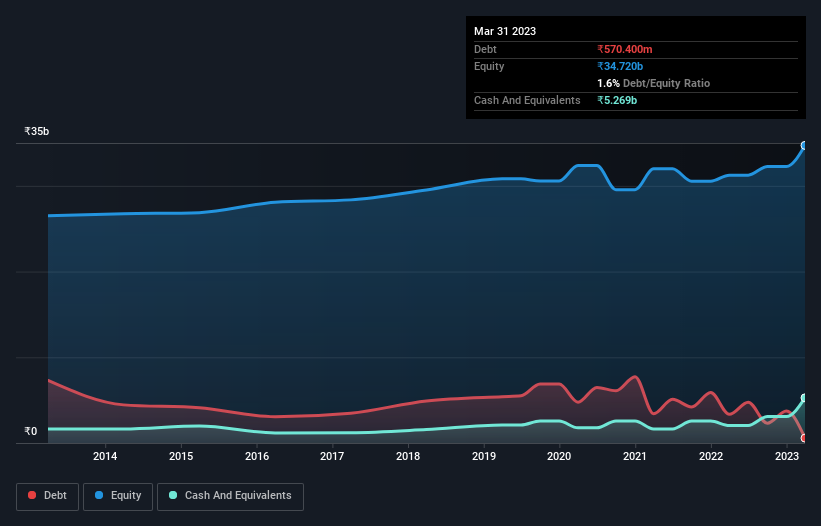The external fund manager backed by Berkshire Hathaway's Charlie Munger, Li Lu, makes no bones about it when he says 'The biggest investment risk is not the volatility of prices, but whether you will suffer a permanent loss of capital.' So it seems the smart money knows that debt - which is usually involved in bankruptcies - is a very important factor, when you assess how risky a company is. We can see that EIH Limited (NSE:EIHOTEL) does use debt in its business. But the real question is whether this debt is making the company risky.
When Is Debt Dangerous?
Generally speaking, debt only becomes a real problem when a company can't easily pay it off, either by raising capital or with its own cash flow. Ultimately, if the company can't fulfill its legal obligations to repay debt, shareholders could walk away with nothing. However, a more frequent (but still costly) occurrence is where a company must issue shares at bargain-basement prices, permanently diluting shareholders, just to shore up its balance sheet. Of course, plenty of companies use debt to fund growth, without any negative consequences. When we think about a company's use of debt, we first look at cash and debt together.
Check out our latest analysis for EIH
How Much Debt Does EIH Carry?
As you can see below, EIH had ₹570.4m of debt at March 2023, down from ₹3.34b a year prior. But on the other hand it also has ₹5.27b in cash, leading to a ₹4.70b net cash position.

How Strong Is EIH's Balance Sheet?
We can see from the most recent balance sheet that EIH had liabilities of ₹5.08b falling due within a year, and liabilities of ₹4.27b due beyond that. Offsetting these obligations, it had cash of ₹5.27b as well as receivables valued at ₹2.24b due within 12 months. So its liabilities outweigh the sum of its cash and (near-term) receivables by ₹1.84b.
Having regard to EIH's size, it seems that its liquid assets are well balanced with its total liabilities. So while it's hard to imagine that the ₹129.8b company is struggling for cash, we still think it's worth monitoring its balance sheet. Despite its noteworthy liabilities, EIH boasts net cash, so it's fair to say it does not have a heavy debt load!
It was also good to see that despite losing money on the EBIT line last year, EIH turned things around in the last 12 months, delivering and EBIT of ₹5.7b. When analysing debt levels, the balance sheet is the obvious place to start. But it is future earnings, more than anything, that will determine EIH's ability to maintain a healthy balance sheet going forward. So if you're focused on the future you can check out this free report showing analyst profit forecasts.
Finally, a company can only pay off debt with cold hard cash, not accounting profits. EIH may have net cash on the balance sheet, but it is still interesting to look at how well the business converts its earnings before interest and tax (EBIT) to free cash flow, because that will influence both its need for, and its capacity to manage debt. Over the last year, EIH recorded free cash flow worth a fulsome 84% of its EBIT, which is stronger than we'd usually expect. That positions it well to pay down debt if desirable to do so.
Summing Up
We could understand if investors are concerned about EIH's liabilities, but we can be reassured by the fact it has has net cash of ₹4.70b. The cherry on top was that in converted 84% of that EBIT to free cash flow, bringing in ₹4.8b. So is EIH's debt a risk? It doesn't seem so to us. The balance sheet is clearly the area to focus on when you are analysing debt. However, not all investment risk resides within the balance sheet - far from it. For example EIH has 2 warning signs (and 1 which is a bit concerning) we think you should know about.
At the end of the day, it's often better to focus on companies that are free from net debt. You can access our special list of such companies (all with a track record of profit growth). It's free.
Valuation is complex, but we're here to simplify it.
Discover if EIH might be undervalued or overvalued with our detailed analysis, featuring fair value estimates, potential risks, dividends, insider trades, and its financial condition.
Access Free AnalysisHave feedback on this article? Concerned about the content? Get in touch with us directly. Alternatively, email editorial-team (at) simplywallst.com.
This article by Simply Wall St is general in nature. We provide commentary based on historical data and analyst forecasts only using an unbiased methodology and our articles are not intended to be financial advice. It does not constitute a recommendation to buy or sell any stock, and does not take account of your objectives, or your financial situation. We aim to bring you long-term focused analysis driven by fundamental data. Note that our analysis may not factor in the latest price-sensitive company announcements or qualitative material. Simply Wall St has no position in any stocks mentioned.
About NSEI:EIHOTEL
EIH
Owns and manages hotels and cruisers under the Oberoi and Trident brand names in India and internationally.
Flawless balance sheet average dividend payer.
Similar Companies
Market Insights
Weekly Picks


Crazy Undervalued 42 Baggers Silver Play (Active & Running Mine)


Fiducian: Compliance Clouds or Value Opportunity?

Willamette Valley Vineyards (WVVI): Not-So-Great Value
Recently Updated Narratives

Significantly undervalued gold explorer in Timmins, finally getting traction

Moderation and Stabilisation: HOLD: Fair Price based on a 4-year Cycle is $12.08


Positioned globally, partnered locally
Popular Narratives


MicroVision will explode future revenue by 380.37% with a vision towards success


NVDA: Expanding AI Demand Will Drive Major Data Center Investments Through 2026





